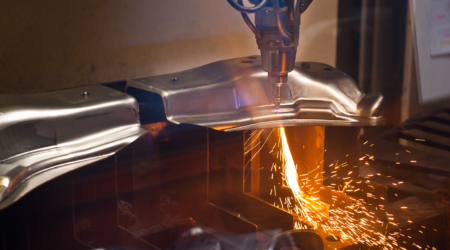Sustainability in manufacturing has never been more important. As regulations tighten and public opinion places increasing importance on corporate social responsibility, the manufacturing industry has recognised the urgency of turning to sustainable and environmentally-friendly practices. And sustainable manufacturing isn’t just about keeping investors, regulators, and customers happy.
There are numerous benefits to sustainable manufacturing practices, from the reduced costs incurred by using cheaper renewable energy sources and making more efficient use of materials, to the new market opportunities that come when a manufacturer can consistently demonstrate green credentials. The Greening Government Commitments 2016-2020, for example, represent a pledge on behalf of the UK government to favour environmentally-friendly businesses when awarding valuable contracts. Increasing the sustainability of manufacturing processes makes sense not only from an environmental and ethical standpoint, but from a business perspective, too. But what practical steps can be taken to increase the sustainability of your manufacturing processes?
Switch to renewable energy
One of the most effective ways to increase sustainability in your manufacturing operation is undoubtedly to switch to renewable energy sources. There are a wide variety of clean energy sources, from wind and hydro to solar and biomass, and each has distinct advantages and drawbacks, but all of them are significantly more environmentally friendly (and often cheaper) than traditional fossil fuel-based energy.
It’s unlikely you’ll be able to switch immediately to 100% clean energy, but you can begin to put new technologies in place to offset your fossil fuel consumption. An easy example would be to install solar panels to generate electricity, and geothermal heat pumps that extract heat from the ground for a clean alternative to heating. If you can’t invest in these technologies yourself, another alternative is to switch to a greener energy tariff with your electricity supplier.
One of the best ways to identify where green energy options can be introduced into your business is to carry out an energy survey. This is a systematic review of how energy is used throughout your site, which can be conducted by yourself or by experienced energy professionals. This survey will identify areas for improvement that, in many cases, can be advanced by introducing new, clean energy technology.
Reduce waste
Cutting down on waste is an effective way to increase sustainability, while also saving money. As with renewable energy, this can sometimes mean investing upfront, but the long-term payoff can be substantial. Energy waste, for example, often comes from the use of inefficient and outdated machinery. Replacing older machines with newer, more efficient models has the potential to dramatically reduce your energy consumption, and with the added bonus of potentially increasing your overall productivity.
Material wastage can also be addressed by reviewing your manufacturing practices. One of the most important innovations in manufacturing has been the rise of automation and computer aided design/ computer aided manufacture (CAD/CAM). Used in laser cutting plants such as ours at Subcon Laser, CAD/CAM ensures the bare minimum of material wastage by eliminating the lack of precision that often accompanies human input. CAD can nest parts on single sheets of material in order to maximise the number of parts produced from a sheet, and directs the laser along an optimised route, making for more economical use of material and minimising expensive and unsustainable waste.
It is inevitable that even the greenest of manufacturers will still generate waste, of course. Even here, though, there are opportunities to take a more sustainable approach. Considering recycling unusable material, or even expanding your business to make use of unwanted output, will help maintain an eco-friendly approach all throughout the manufacturing process.
Develop a sustainable community
Achieving sustainability is not just about refining your own manufacturing practices, but about contributing to a nationwide drive to be more environmentally conscious and economically efficient. Consider reviewing the suppliers, contractors and firms that you work with and encourage them to make similar commitments to sustainability, to ensure that you are one link in a chain of sustainable companies.
The UK also has an extremely active network of academic institutions working at the cutting edge of research into sustainable manufacturing. Many of these have developed tools specifically designed to help UK manufacturers increase the efficiency and sustainability of their businesses. Cambridge University’s Sustainable Manufacturing Group, for example, offers tools to map value, increase efficiency, and save energy. Other research groups, such as Loughborough University’s Centre for Sustainable Manufacturing and Recycling Technologies (SMART), advertise themselves as open to potential collaborations that could lead to benefits for both industry and academia.
Now’s the time
There are as many ways to increase sustainability as there are good reasons to do so. From introducing renewable energy sources to reducing waste by employing technologies such as laser cutting, it has never been easier, and never a better time, to increase both the efficiency and sustainability of your manufacturing operation.









